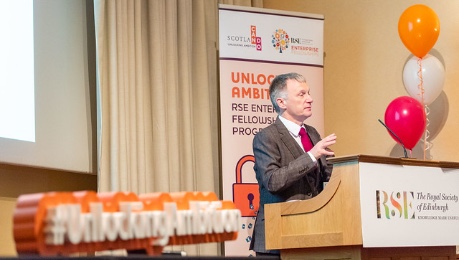Monday 7th October 2019, 10:30am
A report commissioned by The Royal Society of Edinburgh (RSE), Scotlandís National Academy, has established that its Enterprise Fellowship Programme has provided a significant boost to the Scottish, UK and global economies.

An evaluation and economic impact assessment carried out by economic consultancy Biggar Economics has found that the programme has added almost £170 million to annual global GVA, including £77 million in Scotland.
It has led to the creation of more than 3,000 jobs, nearly half (1,395) of which are in Scotland and over 200 businesses.
For every £1 investment, the Fellowship Programme is estimated to have generated almost £10 for the UK economy and £6 for the Scottish economy.
The study also found that businesses created by Fellows are more sustainable than the average, with over 81% of businesses created still operating beyond five years. This compares positively with average survival rates for start-ups and spin-outs, where around 45% survive to their fifth year.
Biggar Economics predicts the annual economic impact of the Enterprise Fellowship will continue to grow as more Enterprise Fellowships are completed and existing Enterprise Fellows continue to expand their businesses.
In addition to significant economic impact, the Enterprise Fellowship programme has been a catalyst for the commercialisation of research and the development of new products and services bringing huge value to society. Successful ideas developed include safety systems for the oil and gas industry, sight-saving therapies for inflammatory eye disease and ethical biotechnology methods for the toxicity testing of new drugs.
"This report shows that the Enterprise Fellowship Programme is enabling us to identify talented and emerging entrepreneurs and help them develop their ideas which in turn are bringing about huge benefits for the economy and society."
"The fact that over four-fifths of the companies set up by our Enterprise Fellows are still in business after five years when high-tech companies have notoriously high failure rates, is testament to the success of the Enterprise Fellowship Programme and evidences the value of ongoing investment."
"As a country with a long and rich history of discovery and innovation, these Enterprise Fellows are our future James Watts and Alexander Flemings, with ideas and innovations that can change the world for the better."
Dr Rebekah Eiddowfield, RSE Chief Executive"We always suspected that our Enterprise Fellows were generating huge impact commercially, and this report allows us to see the proof in real, financial numbers. However, still not captured, even within this report, is the impact from the 25% of Enterprise Fellows that have gone on to become serial entrepreneurs, founding multiple successful businesses. It is this kind of long-term sustainability that the Fellowship Programme is aimed at and we want to encourage more of this in future."
Professor Andy Porter, Vice President Business, RSE and former Enterprise FelloDr. Caroline Barelle, former Enterprise Fellow and CEO of Elasmogen, a biopharmaceutical company progressing next-generation soloMER products for the sight-saving treatment of inflammatory diseases of the eye and inflammatory conditions of the gut, said:-
"I didnít know about legals, employing people, how you get investment, how you spin a company out, how you put a board together. The Fellowship offered that. It gave me the framework and the support system to go through the process. It helped make a conversion from talking science to pitching science."
Dr Caroline Barelle, former Enterprise Fellow and CEO of ElasmogenSource: The Royal Society of Edinburgh